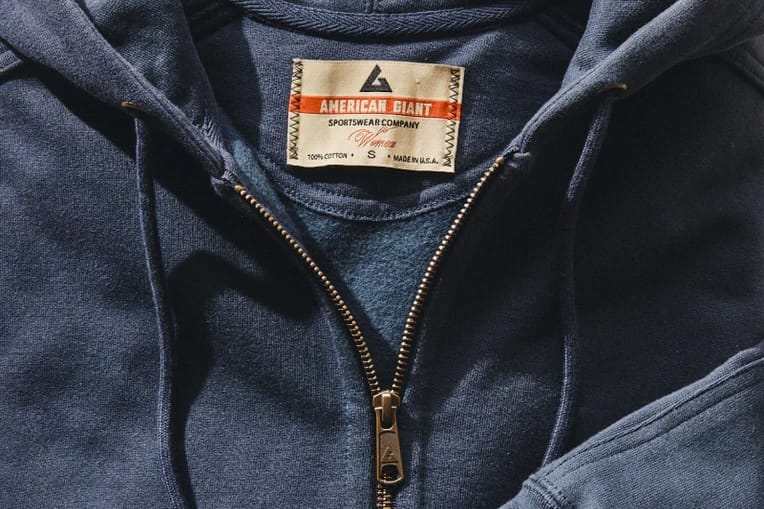

Introduction to American Giant
American Giant is a San Francisco-based manufacturer of sportswear and casual clothing that has garnered significant attention for its commitment to producing high-quality, made-in-the-USA products. Founded in February 2012 by Bayard Winthrop, the former head of Chrome Industries, American Giant set out to address the lack of affordably priced, high-quality clothing made in America. By selling directly to customers through its website, the company aims to save on distribution and marketing costs, enabling it to offer mainstream-priced products manufactured domestically.Winthrop's vision was to create a brand that would breathe new life into U.S. apparel manufacturing. This effort has been recognized, with American Giant being named one of the 50 Most Innovative Companies by Fast Company in 2015. The company's initial success was fueled by its Classic Full Zip hooded sweatshirt, which was hailed as 'the greatest hoodie ever made' in a Slate review. This praise led to a surge in demand, highlighting the market's appetite for quality, American-made clothing.
History and Mission
American Giant's journey began with a single product, the Classic Full Zip hooded sweatshirt, designed by Philipe Manoux, a former industrial engineer at Apple. This sweatshirt was crafted using cotton grown in North Carolina and featured reinforced elbow pads, a double-lined hood, and custom hardware. The company's mission is to provide exceptional quality clothing that is durable rather than disposable, thereby reducing landfill waste and promoting ethical consumerism.The company's supply chain is largely based in North Carolina, a state known for its 'right to work' laws, which have contributed to lower labor rates. Despite the challenges of mass-producing high-quality products, American Giant has expanded its manufacturing to include factories in Los Angeles and Middlesex, North Carolina.
Manufacturing Process
The production process of American Giant's clothing is meticulous and labor-intensive. It begins with the harvesting of cotton from farms in North Carolina and South Carolina. The cotton is then processed through gins to remove seeds and other natural elements, followed by grading, baling, and sale at the cotton exchange. The cotton is subsequently turned into yarn, knitted into fabric, dyed, napped, and washed.Each piece of clothing, such as the sweatshirts, involves numerous steps. For example, American Giant’s sweatshirts have 69 different pieces, all cut by hand. Skilled tradesmen cut the fabric from rolls laid out flat on cutting tables, and then assemble and stitch the pieces together. The hardware is added, and the sweatshirts are pre-washed and shrunk to fit before being shipped to the fulfillment center in Kentucky.
Product Line and Quality
American Giant's product line has expanded significantly since its inception. It now includes a variety of men's sweatshirts, tee-shirts, sweatpants, as well as women's sportswear and jeans. The company also offers yarn-dyed flannel shirts, which were introduced in 2018.The quality of American Giant's products is evident in their durability and comfort. The Classic Full Zip hooded sweatshirt, for instance, is made from heavyweight fleece with a tightly-knit exterior face for wind blocking and a soft, napped interior. The attention to detail extends to the reinforced elbow pads and custom hardware, ensuring that the product is both functional and aesthetically pleasing.
Impact on Local Communities
American Giant's commitment to manufacturing in the USA has a positive impact on local communities. The company provides jobs and economic opportunities in areas such as Middlesex, North Carolina, where it has helped revitalize the local economy. The presence of American Giant in these communities is marked by signs of growth, including a high demand for experienced sewing machine operators.
Ethical Manufacturing
American Giant stands out in the apparel industry for its ethical manufacturing practices. By avoiding fast fashion and trend-driven designs, the company focuses on creating wardrobe staples that are meant to last. This approach reduces the environmental impact associated with frequent purchases and disposals of low-quality clothing.The company's supply chain is transparent, with cotton sourced from local farms and processed through domestic facilities. This ensures better control over quality and working conditions, aligning with the company's ethical standards.
Customer Feedback and Reviews
Customer reviews of American Giant's products highlight the exceptional quality and durability of the clothing. Reviewers have praised the sweatpants and sweatshirts for their comfort and resilience, even after multiple wears and washes. While some pieces may prioritize aesthetics over functionality, the overall consensus is that American Giant's products are worth the investment due to their timeless design and high-quality construction.
Pricing and Value
American Giant's products are priced higher than those of many competitors, but the quality and durability justify the cost. The company's focus on creating long-lasting clothing means that customers are less likely to need frequent replacements, making the investment more cost-effective in the long run.
Conclusion
In summary, American Giant represents a significant shift in the apparel industry by prioritizing quality, durability, and ethical manufacturing practices. The company's commitment to producing clothing in the USA not only supports local communities but also ensures that customers receive high-quality products that stand the test of time. For those willing to invest in lasting apparel, American Giant offers a compelling alternative to fast fashion.
In Summary
American Giant's story is one of innovation and dedication to quality. From its inception, the company has focused on creating products that are not just stylish but also durable and ethically made. The meticulous manufacturing process, the use of high-quality materials, and the commitment to local communities all contribute to a brand that is making a positive impact in the apparel industry.
Useful Links
American Giant Official Website
Dues are $12 per year. Member benefits:
✅ Ad-Free Website Viewing
✅ Advocacy for Republican Seniors
✅ 120+ Senior Discounts
✅ Member Only Newsletters